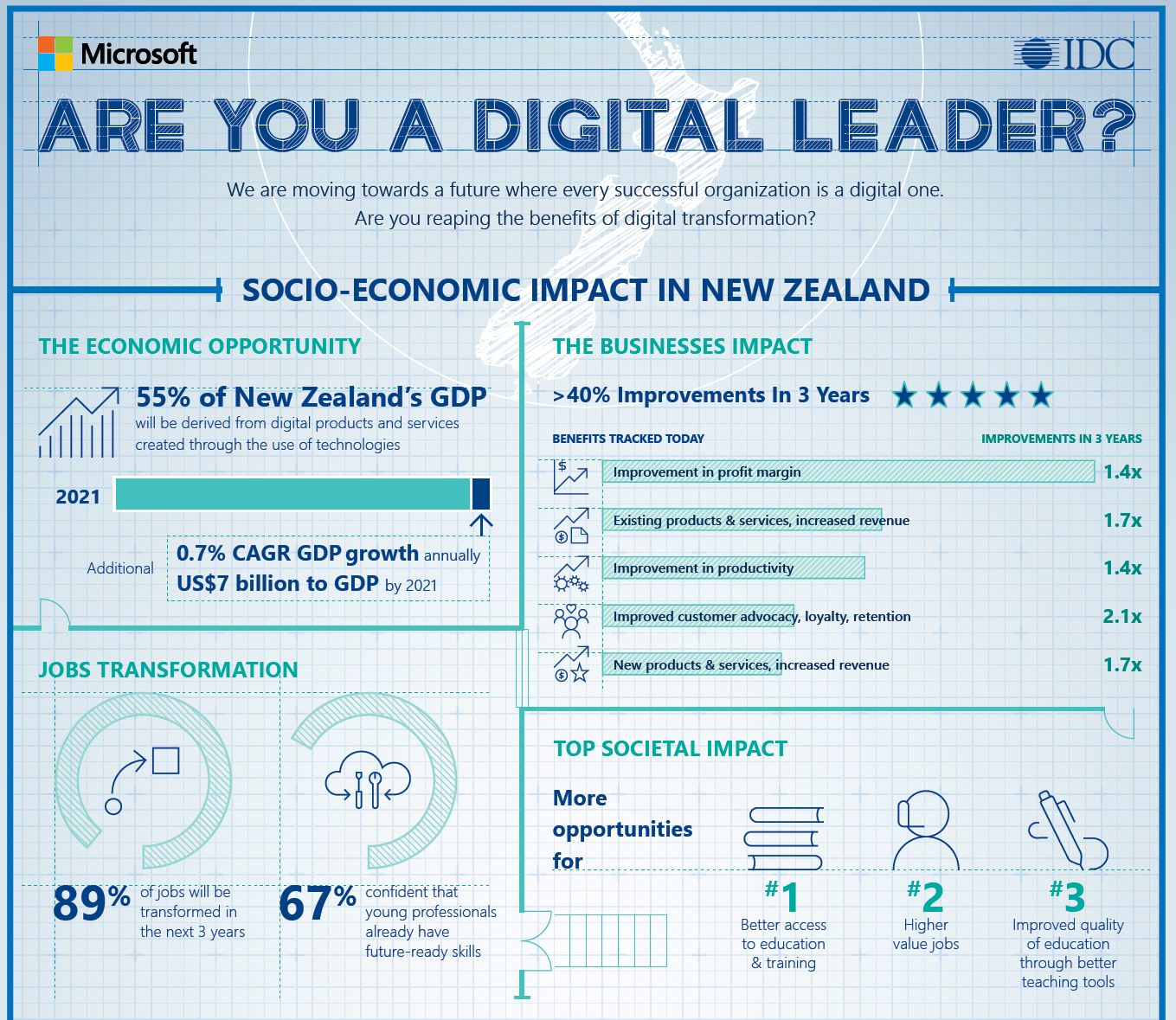According to new research released by IDC and Microsoft digital technology is not simply going to have a huge impact on business but also on society – and the transformation will take just three years.
Today 6% of New Zealand’s GDP is contributed by digital technology but by 2021 that will skyrocket to 55% – adding $9.6 billion to the economy.
The sheer rate of change for New Zealand’s economy was driven home yesterday as the latest research by Microsoft and IDC, Unlocking the Economic Impact of Digital Transformation, was presented by Microsoft New Zealand managing director Barrie Sheers and a panel of experts at the Microsoft Digital Transformation Roundtable.
According to Shane Minogue’s, Senior Research Manager IDC, current thinking about what digitisation looks like barely scratches the surface. Shane gave the example of an airline whose digital operations are currently limited to selling tickets online.
‘Today when we look at organisations, digital transformation is being used for productivity improvements and efficiencies in lowering cost, but it’s not really changing the strategy of companies,’ Shane said.
‘By 2021, you’ll start to see companies really embrace digital transformation and third platform technologies across the organisation. They might be using 3D printing for aeroplane parts, AI and cognitive for planes taking off and landing, you may see them using AI for fuel efficiencies, data analytics for price optimisation and even drones for security. On the face of it, little has changed, but in the background, a huge transformation has taken place.’
The good news is 95% of Kiwi organisations are aware that digital transformation is important, even if just 7% could be classified as leaders. One of those is Auckland Transport – and for once the subject of commuting got Aucklanders smiling. According to the third panellist, Auckland Transport Chief Technology Officer, Roger Jones, digital transformation could soon allow travellers to combine parking, public transport and even airfares on the one bill.
Expect a future of personalised options, he said, stressing that integrating a range of platforms and tools like data analytics and AI was key to business transformation. ‘It’s no longer about just one solution that will transform your organisation. The Big Solution is dead.’
Microsoft National Technology Officer, Russell Craig, said to become true digital operations, Kiwi organisations need to ‘free their data’ from old legacy systems and embrace the cloud, as well as having a strategy that is focused on adding value to customers and improving engagement rather than profit margins. He cited cute Air New Zealand chatbot Oscar as an example of clever customer-centred AI.
The underlying message from all the panellists was that the digital future is fast approaching, and we need to be prepared as a nation to embrace it. For instance, in just three years, 89% of all Kiwi jobs are going to be transformed by technology – and the experts could not be more positive.
Shane Minogue revealed that only about one in ten Kiwis (11%) can expect their jobs to remain the same by 2021, as businesses are transformed by digital technologies such as AI, IoT and big data analytics. Meanwhile 38% of people would need to be retrained or upskilled, while automation would lead to almost a quarter of jobs (24%) being automated or made redundant.
Russell Craig said this would only speed up the change we’ve already witnessed over the past 20 years, with the emergence of new roles to replace the likes of typists, for example.
“This is not new, but what this means is that retraining is mandatory, and so is a greater focus on teaching soft skills such as adaptability and resilience, as no one really knows what the future is going to look like.”
Shane advised a bottom up approach, starting with small projects that gave organisations quick wins, motivating staff and transforming culture beyond senior leadership spin.
‘Often, if you take that top level of leadership out of the room, you hear the truth. Middle managers tell a very different story. They talk about how “Agile” can result in getting nothing done, objectives not being met, with many unsure of their ever-changing responsibilities. This highlights a digital transformation culture that isn’t permeating throughout the whole organisation.’
Shane argued an entire organisation, as well as partners and third parties, needed to be involved in digital transformation strategies – and it needed to happen fast.
“In short, what this study showed is that digital transformation is now happening and it’s going to accelerate quickly over the next couple of years. The key takeaway is that you must start your digital transformation strategy today.”

